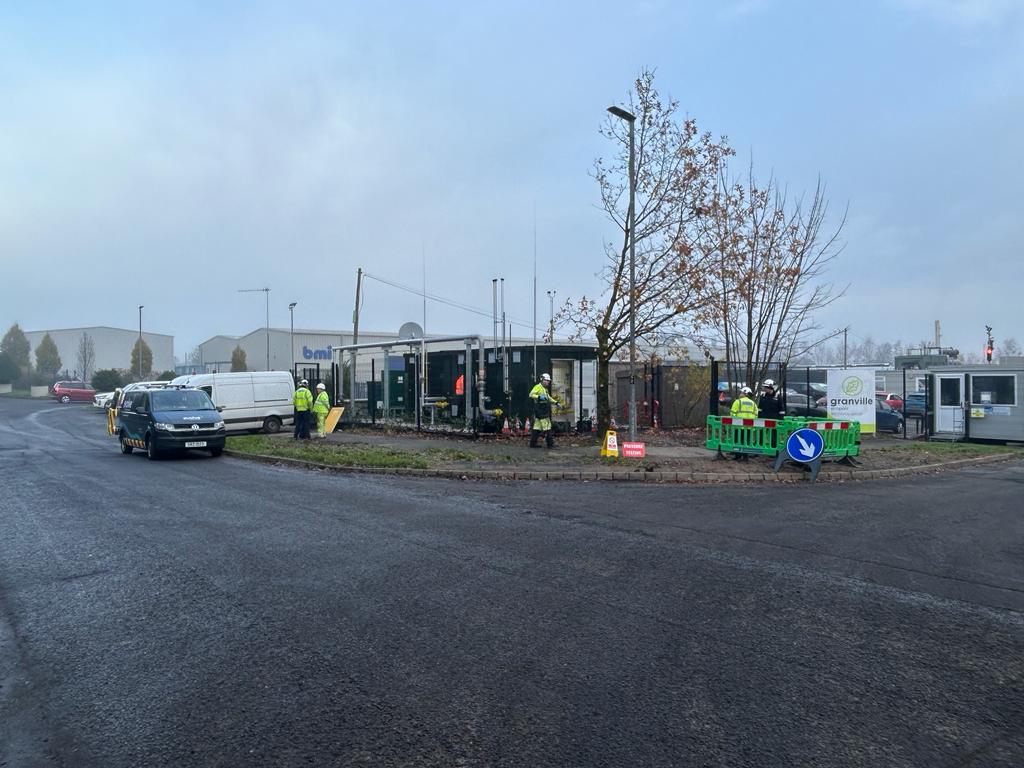In a first for Northern Ireland, our Granville Eco Park site in Dungannon, NI has started injecting renewable biomethane into the local gas network.
Having installed a £1.2m gas to grid system at our existing anaerobic digestor, we have the capability to export enough gas to decarbonise Dungannon’s entire annual gas consumption.
The gas injection went live on Thursday 16th November and because biomethane is similar to natural gas, it is able to be blended into the network without the need for any changes in transmission and distribution infrastructure or end-user equipment.
Being 100% renewable and compliant with existing gas infrastructure means biomethane has the potential to play a major role in Northern Ireland’s transition to net zero. When generated from organic waste and used for heat, biomethane could produce greenhouse gas savings of up to 92% compared to natural gas.
Welcoming the significant milestone for Northern Ireland Our Chief Technical Officer Dr David McKee said,
“This is the first major step in increasing the amount of power, heat and transport that can be fuelled by renewable gas. Bio Capital has a wealth of experience in this area and a number of its other UK facilities are already injecting biomethane into the gas network, but this is a first for Northern Ireland – where we begin our journey towards a sustainable drive for indigenous renewable gas.
“Granville has been generating renewable gas since 2014. Up until now we have been using the gas to generate electricity on site, fuelling gas powered HGVs and transporting biomethane to customers for heat and power by road in pressurised containers. Having this gas to grid connection now offers us a further route to market.
“Replacing imported fossil fuels with a renewable low carbon alternative will go a significant way towards helping Northern Ireland exceed its targets set within the Energy Strategy and Climate Change Act. Diverting biodegradable waste from landfill to generate biomethane is also in line with the draft Circular Economy Strategy and the Department of Agriculture, Environment and Rural Affairs (DAERA) ambition to ban biodegradable goods going to landfill by 2030.”
The largest facility of its kind in Northern Ireland, we produce biomethane by recycling biodegradable waste (packaged and unpackaged) from local Councils, the hospitality sector and food and drink processors as well as using it as a feedstock for anaerobic digestion.
On 16th November 2023, we confirmed the first, successful injection of renewable biomethane into the gas grid. We will continue to produce renewable electricity and transport biomethane to our client sites to fuel their combined heat and power plants to help them reduce their carbon emissions.
The anaerobic digestion process produces a nutrient rich Biofertiliser which is currently used to fertilise local farmland and in turn reduces farmers’ reliance on expensive and carbon intensive imported artificial fertiliser.
CO2 is then separated from biogas when it is being upgraded to biomethane and Bio Capital is exploring opportunities to export biofertiliser and supply renewable CO2 to food and drink customers which would further bolster the circular economy.
We were advised by A&L Goodbody and MBA Planning and the installation was completed by CNG Services Ltd.
To find out more about Bio Capital or to speak about your waste and energy requirement, please email info@bc.modusaims.net
